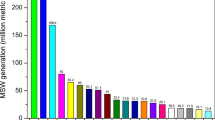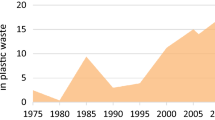Abstract
A new approach to waste recycling called “waste bank” has recently appeared in Southeast Asian countries. Typically, waste banks allow members to exchange recyclable materials for revenue, with different returns based on the type and weight of the materials. However, participant numbers remain low, and improvements to the system are necessary to encourage participants to separate their waste. The aim of this study was to determine the factors that influence the period of participation in a waste bank in Malang City, Indonesia. A sample of 216 participants was obtained for the correlation between variables and a multiple-regression analysis. It was found that many respondents were frustrated by the volume of items requiring separation. We suggest that the number of recovery items without substantial economic benefit should be minimized to encourage participants to separate and bring their resources and to participate regularly. This would also be helpful in prolonging participation periods. Many participants regarded the waste-separation concept as an unfamiliar one. Our results may be useful for other Southeast Asian countries at the same economic level as Indonesia who wish to encourage the establishment of waste banks.


Similar content being viewed by others
References
Mangimbulude JC, van Breukelen BM, Krave AS, van Straalen NM, Röling WFM (2009) Seasonal dynamics in leachate hydrochemistry and natural attenuation in surface run-off water from a tropical landfill. Waste Manage 29:829–838. https://doi.org/10.1016/j.wasman.2008.06.020
Asim M, Batool SA, Chaudhry MN (2012) Scavengers and their role in the recycling of waste in Southwestern Lahore. Resour Conserv Recycl 58:152–162. https://doi.org/10.1016/j.resconrec.2011.10.013
Ezeah C, Fazakerley JA, Roberts CL (2013) Emerging trends in informal sector recycling in developing and transition countries. Waste Manage 33:2509–2519. https://doi.org/10.1016/j.wasman.2013.06.020
Fei F, Qu L, Wen Z, Xue Y, Zhang H (2016) How to integrate the informal recycling system into municipal solid waste management in developing countries: based on a China’s case in Suzhou urban area. Resour Conserv Recycl 110:74–86. https://doi.org/10.1016/j.resconrec.2016.03.019
Tiew K-G, Basri NEA, Watanabe K, Abushammala MFM, Ibrahim MTB (2014) Assessment of the sustainability level of community waste recycling program in Malaysia. J Mater Cycles Waste Manag 17:598–605. https://doi.org/10.1007/s10163-014-0273-7
Indrianti N (2016) Community-based solid waste bank model for sustainable education. Procedia Social Behav Sci IRSSM-6 6th Int Res Symp Service Manag 224:158–166. https://doi.org/10.1016/j.sbspro.2016.05.431
Mohamad ZF, Idris N, Baharuddin A, Muhammad A, Nik Sulaiman NM (2012) The role of religious community in recycling: empirical insights from Malaysia. Resour Conserv Recycl 58:143–151. https://doi.org/10.1016/j.resconrec.2011.09.020
Raharjo S, Matsumoto T, Ihsan T, Rachman I, Gustin L (2017) Community-based solid waste bank program for municipal solid waste management improvement in Indonesia: a case study of Padang city. J Mater Cycles Waste Manag 19:201–212. https://doi.org/10.1007/s10163-015-0401-z
Sekito T, Prayogo TB, Dote Y, Yoshitake T, Bagus I (2009) Influence of a community-based waste management system on people’s behavior and waste reduction. Resour Conserv Recycl 72:84–90. https://doi.org/10.1016/j.resconrec.2013.01.001
Tallei TE (2013) Local community-based initiatives of waste management activities on Bunaken Island in North Sulawesi. Res J Environ Earth Sci 5:737–743
Willmott L, Graci S (2012) Solid waste management in small island destinations : a case study of Gili Trawangan. Indonesia Innov Sustain Tourism. https://doi.org/10.7202/1036566ar
Aroonsrimorakot S, Pradabphetrat P (2010) Potential of recycle waste bank project for community waste reduction: a case study of Sub-Sin Pattana community, Bang Khun Thien. Bangkok J Environ Res 32:37–48
Singhirunnusorn W, Donlakorn K, Kaewhanin W (2012) Contextual factors influencing household recycling behaviours: a case of waste bank project in Mahasarakham municipality. Procedia Soc Soc Behav Sci 36:688–697. https://doi.org/10.1016/j.sbspro.2012.03.075
Suttibak S, Nitivattananon V (2008) Assessment of factors influencing the performance of solid waste recycling programs. Resour Conserv Recycl 53:45–56. https://doi.org/10.1016/j.resconrec.2008.09.004
Wijayanti DR, Suryani S (2015) Waste bank as community-based environmental governance: a lesson learned from Surabaya. Procedia Soc Behav Sci 184:171–179. https://doi.org/10.1016/j.sbspro.2015.05.077
Sekito T, Prayogo TB, Meidiana C, Dote Y (2019) Estimating the flow of recyclable items and potential revenue at a waste bank: the case in Malang City, Indonesia. Environ Dev Sustain 21:2979–2995. https://doi.org/10.1007/s10668-018-0175-2
Guerin D, Crete J, Mercier J (2001) A multilevel analysis of the determinants of recycling behavior in the European countries. Soc Sci Res 30:195–218. https://doi.org/10.1006/ssre.2000.0694
Martin M, Williams ID, Clark M (2006) Social, cultural and structural influences on household waste recycling: a case study. Resour Conserv Recycl 48:357–395. https://doi.org/10.1016/j.resconrec.2005.09.005
Stoeva K, Alriksson S (2017) Influence of recycling programs on waste separation behavior. Waste Manage 68:732–741. https://doi.org/10.1016/j.wasman.2017.06.005
Zhong H, Huang L (2016) The empirical research on the consumers’ willingness to participate in e-waste recycling with a points reward system. Energy Procedia 104:475–480. https://doi.org/10.1016/j.egypro.2016.12.080
Oliveira V, Sousa V, Vaz JM, Dias-Ferreira C (2018) Model for the separate collection of packaging waste in Portuguese low-performing recycling regions. J Environ Manage 216:13–24. https://doi.org/10.1016/j.jenvman.2017.04.065
Sidique SF, Lupi F, Joshi SV (2010) The effects of behavior and attitudes on drop-off recycling activities. Resour Conserv Recycl 54:163–170. https://doi.org/10.1016/j.resconrec.2009.07.012
Abd’Razack NTA, Medayese SO, Shaibu SI, Adeleye BM (2017) Habits and benefits of recycling solid waste among households in Kaduna, North West Nigeria. Sustain Cities Society 28:297–306. https://doi.org/10.1016/j.scs.2016.10.004
Alexander C, Smaje C, Timlett R, Williams I (2009) Improving social technologies for recycling. Waste Resour Manage 162:15–28. https://doi.org/10.1680/warm.2009.162.1.15
Lo AY, Liu S (2018) Towards sustainable consumption: a socio-economic analysis of household waste recycling outcomes in Hong Kong. J Environ Manage 214:416–425. https://doi.org/10.1016/j.jenvman.2018.03.029
Hage O, Söderholm P (2008) An econometric analysis of regional differences in household waste collection: the case of plastic packaging waste in Sweden. Waste Manage 28:1720–1731. https://doi.org/10.1016/j.wasman.2007.08.022
Knussen C, Yule F, MacKenzie J, Wells M (2004) An analysis of intentions to recycle household waste: the roles of past behaviour, perceived habit, and perceived lack of facilities. J Environ Psychol 24:237–246. https://doi.org/10.1016/j.jenvp.2003.12.001
Perrin D, Barton J (2001) Issues associated with transforming household attitudes and opinions into materials recovery: a review of two kerbside recycling schemes. Resour Conserv Recycl 33:61–74. https://doi.org/10.1016/S0921-3449(01)00075-1
Vassanadumrongdee S, Kittipongvises S (2018) Factors influencing source separation intention and willingness to pay for improving waste management in Bangkok. Thailand Sustain Environ Res 28:90–99. https://doi.org/10.1016/j.serj.2017.11.003
Matsuyama A, Sekito T, Meidiana C, Prayogo TB, Dote Y (2015) Factors Influencing the resource separation behavior by the waste bank system in Malang City. Memoirs Faculty Eng Univ Miyazaki 44:161–166
Knussen C, Yule F (2008) “I’m Not in the Habit of Recycling”: the role of habitual behavior in the disposal of household waste. Environ Behav 40:683–702. https://doi.org/10.1177/0013916507307527
Timlett RE, Williams ID (2009) The impact of transient populations on recycling behaviour in a densely populated urban environment. Resour Conserv Recycl 53:498–506. https://doi.org/10.1016/j.resconrec.2009.03.010
Acknowledgements
The part of this work was supported by MEXT KAKENHI Grant Number 16K12661.
Author information
Authors and Affiliations
Corresponding author
Additional information
Publisher's Note
Springer Nature remains neutral with regard to jurisdictional claims in published maps and institutional affiliations.
Rights and permissions
About this article
Cite this article
Sekito, T., Matsuyama, A., Prayogo, T.B. et al. Factors influencing the period of participation in a waste bank system in Malang City, Indonesia. J Mater Cycles Waste Manag 22, 1614–1619 (2020). https://doi.org/10.1007/s10163-020-01049-8
Received:
Accepted:
Published:
Issue Date:
DOI: https://doi.org/10.1007/s10163-020-01049-8




